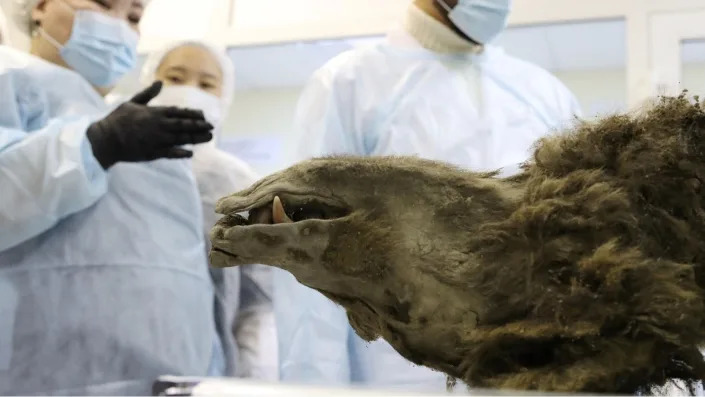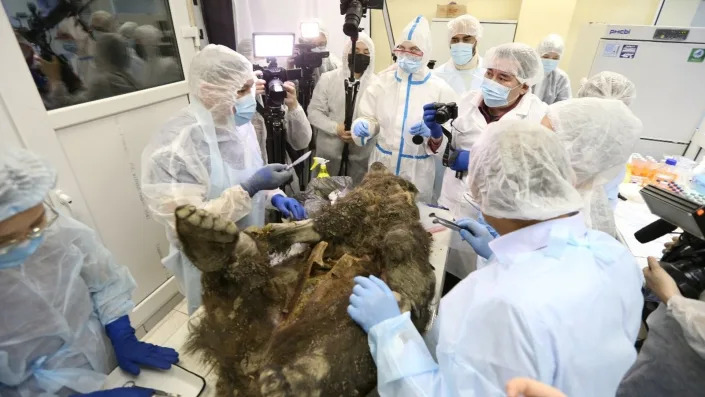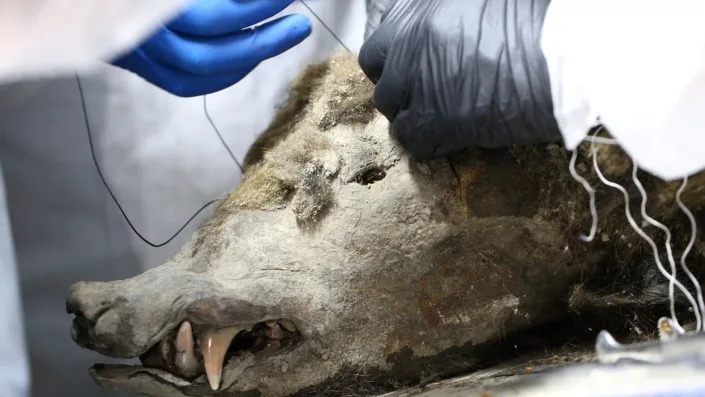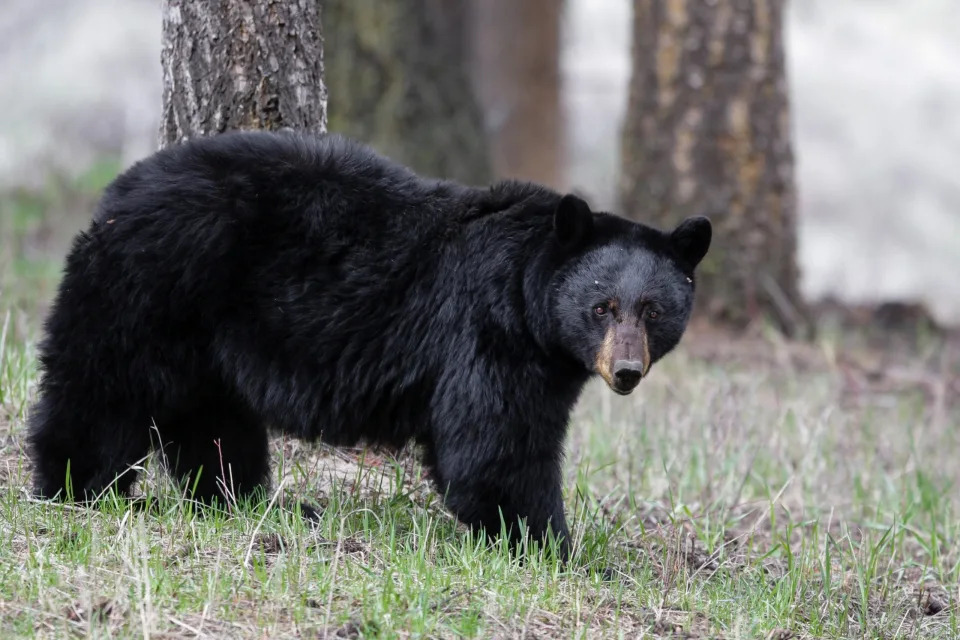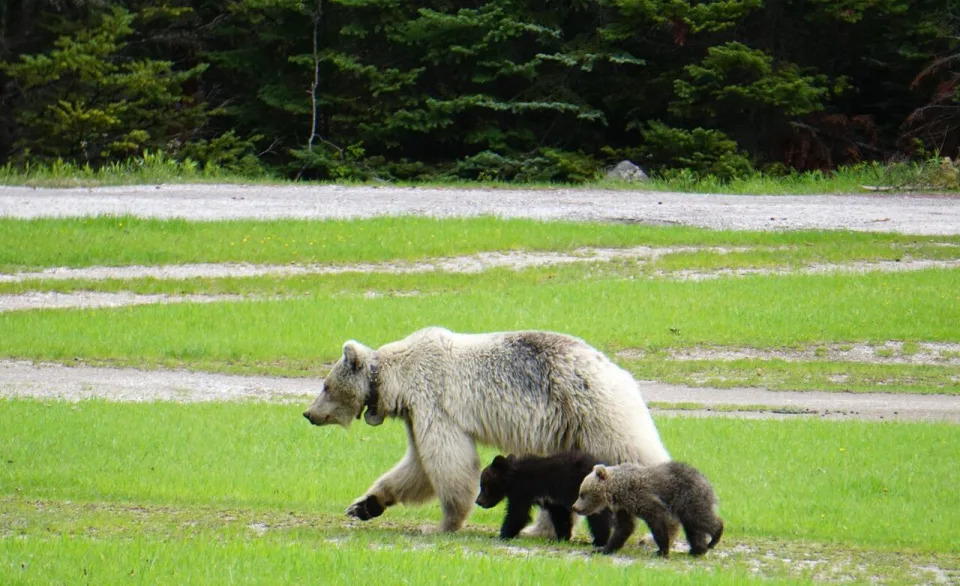Park officials found the victims early Saturday morning, after receiving an alert from a satellite device hours earlier. A grizzly near the site displayed “aggressive behavior,” they said.

By Livia Albeck-Ripka
Published Oct. 1, 2023Updated Oct. 2, 2023
A grizzly bear is believed to have attacked and killed two people at a national park in southwest Canada, park officials said on Sunday.
Parks Canada said it learned of the attack via an alert sent around 8 p.m. on Friday from a satellite device inside Banff National Park in Alberta, Canada, according to a statement shared on the park’s Facebook page.
GPS coordinates showed the alert was sent from west of Ya Ha Tinda Ranch in the Red Deer River Valley, around 80 miles northwest of Calgary, Alberta. Bad weather hindered a response team from reaching the site by helicopter, so they instead traveled by ground overnight, officials said.
The team, which specialized in responding to wildlife attacks, arrived at 1 a.m. on Saturday to find the two dead people, as well as a grizzly bear that was displaying “aggressive behavior.” They euthanized the bear on-site “to ensure public safety,” according to the statement. The police arrived at 5 a.m. and helped transport the victims to Sundre, a town about 40 miles east.
The victims have not been named, but the CBC reported that they were a married couple. Kim Titchener, who lives in Edmonton, near Banff National Park, and who is a friend of a close relative of the couple, said their dog had also been killed in the attack. “They were in a very remote area,” Ms. Titchener, a wildlife conflict specialist, said in a phone interview on Sunday.
Parks Canada did not immediately respond to requests for further information about the victims or the attack.
An estimated 691 grizzly bears live in Alberta, 65 of them in Banff National Park, according to Parks Canada, which reminds visitors to be prepared for encounters. It advises traveling in groups, making noise and carrying bear spray. In Alberta, the grizzly bear, a largely solitary, omnivorous animal that can live as long as 30 years in the wild, is listed as “threatened.”
Bear attacks on humans are relatively rare, but they can occur when a bear is feeding, protecting its young or surprised. Attacks that kill more than one person appear to be even rarer.
In January, a polar bear killed a 24-year-old mother and her 1-year-old son in Wales, Alaska. In 2018, a grizzly bear, which the authorities later described as starving, killed a woman and her baby in Yukon, Canada.
Banff National Park described Friday’s attack as a “tragic incident” and expressed its condolences to the families and friends of the victims. As a safety precaution, park authorities closed the Red Deer and Panther valleys until further notice.
Bear Attacks
Grizzly Bear That Had Killed a Woman Is Euthanized After Breaking Into a House
Sept. 6, 2023
Bear Attack Sends New York Boy to the Hospital
Aug. 22, 2023
Woman Is Killed by a Bear Near Yellowstone, Officials Say
July 24, 2023
Livia Albeck-Ripka is a reporter for The Times based in California. She was previously a reporter in the Australia bureau. More about Livia Albeck-Ripka
Calgary
Couple dead after bear attack in Banff National Park, grizzly killed
The common-law couple were experienced in the backcountry, says family member
A grizzly bear attacked and killed two people in Banff National Park west of Sundre, Alta., on Friday night, Parks Canada says.
The people who died were common-law partners, according to a family member of one of the deceased whose name CBC News is choosing to keep confidential until all members of the family have been notified. The couple's dog, who was with them at the time, was also killed.
"They were long-term partners who loved the outdoors and were inseparable," read a statement from the family member.
"They lived for being in the backcountry and were two of the most cautious people I know. They knew bear protocol and followed it to a tee."
Parks Canada received an alert from a GPS device in the Red Deer River Valley west of Ya Ha Tinda Ranch at about 8 p.m. on Friday indicating a bear attack, said Natalie Fay, external relations manager for the Banff field unit.
In a statement, Fay said a team specially trained in wildlife attacks was immediately mobilized, but weather hindered their response time.
"Weather conditions at the time did not allow for helicopter use, and the response team travelled through the night to the location by the ground," she said.
"The response team arrived on-site at 1 a.m. and discovered two deceased individuals."
While in the area, the response team encountered a grizzly bear displaying aggressive behaviour, Fay said, leading Parks Canada staff to destroy the animal on-site for public safety.
RCMP arrived at 5 a.m. to transport the victims to Sundre, Alta., she said.
"This is a tragic incident and Parks Canada wishes to express its sincere condolences to the families and friends of the victims," the statement read.
Fatal bear attacks rare
Only 14 per cent of grizzly bear attacks worldwide lead to fatalities, said Titchener, making this incident a rare occurrence.
"Often when people have encounters with grizzlies, usually the grizzly goes one direction and the people go in the other," said Titchener.
"So we rarely do see cases where we actually have everyone involved killed."
Titchener said that while she doesn't yet know the details of what happened, the majority of bear attacks tend to be caused by surprise run-ins. She added that the couple could have still been hiking or setting up their camp when they came in contact with the bear, and that bears do tend to be more active at dusk.
"They could have surprised a bear at close range and had an encounter that led to a defensive attack. It's extremely rare to see predatory attacks by grizzly bears, but not unheard of."
According to the family member of one of the deceased, the family received a notification via inReach at 5 p.m. that the couple had camped for the night.
"They checked in every night," said the family member. "This means they were not travelling after dark and they were not setting up camp when the attack happened."
At this time of year, bears are in hyperphagia, said Titchener, a period of increased appetite as bears prepare to hibernate for the winter. While Titchener said there is no relationship between this time frame and increased bear attacks on humans, bears are indeed hungry.
"They're still trying to dig up root systems and just trying to eat what grasses are left and what berries are still around to get on those last few pounds so that they can start heading to their dens," said Titchener.
While some bears begin to den in mid-October, larger bears can stay active until December, a reminder that it is still actively bear season across the province, said Titchener.
A remote area
Merle Fox and his wife Laurie have managed Sunset Guiding and Outfitting west of Sundre for the last 14 years. Fox said his camp is roughly three hours west of where the attack happened by horseback.
"Well, I hate to say it, but I wasn't really surprised," Fox said in response to hearing about the attack.
"Bears are hungry at this time of the year and there are no berries or a thing out there for them this year."
Fox said a late frost in spring froze off all the berry blossoms, leading to a shortage of one of bears' main food groups. He added that faced with a vegetation shortage, grizzly bears will turn to eating deer, young elk, or wild horses instead.
"I think that's probably why these two people were attacked, is that the bear was hungry and he saw them as an easy target."
While he's not too nervous traversing the area given his experience, Fox said he and his guides often head into the backcountry armed, just in case they do encounter a bear.
He said the terrain in the area where the attack occurred is made up of steep cliffs, and is only accessible by foot or on horseback.
The fact that the bear was still in the area when the Parks Canada response team arrived on the scene is "highly unusual", said Titchener, especially if the attack was a defensive one.
"Usually the attack occurs and then the bear leaves the area," she said.
"So that of course is concerning and I'm not sure what was going on there, but of course those details will come out as they do the investigation."
Titchener added that one of the reasons Parks Canada responders would kill a bear on-the-spot is if it was behaving aggressively toward them.
"Obviously they had to take that bear's life so that they could hopefully get to those people. But unfortunately, it was too late."
Bear safety still important
Brushing up on bear safety remains a vital tool for hikers and those participating in outdoor activities, said Titchener.
She advised that travelling in groups, making noise to let animals know you're in the area and carrying bear spray, are all effective ways to prevent attacks from happening.
If people see any signs of bears while they are on a trail, including scat, diggings, claw marks or tracks, or if they see an animal carcass or birds circling, they should leave the area immediately, said Titchener.
Titchener said that if people do encounter a bear, they should stay together as a group and pull out their bear spray. She added that taking a bear safety course can help people further understand bear behaviour and determine whether a bear is acting in a defensive or predatory way.
Parks Canada said a closure order is in place around the area where the couple were attacked — including the Red Deer and Panther valleys, from Snow Creek Summit east to the National Park boundary, and north to Shale Pass — until further notice as a safety precaution.
Clarifications
- A previous version of this story said the people who died were husband and wife. A family member has informed CBC News that they were common-law partners.Oct 01, 2023 8:37 PM MT
With files from the Canadian Press, Tracy Johnson, Boshika Gupta, Julian Brown and Yvette Brend








